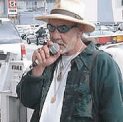Feature Archives
At 5pm on March 29th, the SF Board of Supervisors will hear Green Party Supervisor Ross Mirkarimi's proposed moratorium on pot clubs. Many medical cannabis supporters believe this should be protested immediately and loudly. They say, "We will not go back to the fascist 50s; we voted 78% for Prop 215; we must continue to provide leadership by encouraging pot clubs everywhere and by supporting legislation to legalize all drugs as exists in most countries, thus getting all drugs off the street and eliminating the prison-industrial complex."
The proposed moratorium is Item 35 on the March 29th agenda. Medical cannabis is also on the agenda as Item 29, sponsored by Supervisors Mirkarimi, Alioto-Pier, Maxwell, Peskin, McGoldrick, Elsbernd, Ammiano, Ma, Dufty and as Item 28. The Board of Supes Meeting begins at 2pm, and if people want to hear discussion of these two other items, they should arrive as early in the meeting as they can.
In advance of the meeting, people have been asking for supporters to protest via phone, email, and snail mail. Read more
The proposed moratorium is Item 35 on the March 29th agenda. Medical cannabis is also on the agenda as Item 29, sponsored by Supervisors Mirkarimi, Alioto-Pier, Maxwell, Peskin, McGoldrick, Elsbernd, Ammiano, Ma, Dufty and as Item 28. The Board of Supes Meeting begins at 2pm, and if people want to hear discussion of these two other items, they should arrive as early in the meeting as they can.
In advance of the meeting, people have been asking for supporters to protest via phone, email, and snail mail. Read more
April 10th Update: Minister Faces Four Life Sentences For Religious Beliefs
After multiple rescheduled court dates and even an early court appearance on March 11th of which his wife, attorney, and supporters were not informed, Eddy Lepp has been having more regular hearings in Judge Patel's court in San Francisco. Eddy Lepp's supporters have been led to wonder if this rescheduling was an attempt by the government to subvert his legal rights. Lack of warning about an appearance would keep Eddy from preparing his defense. People who have attended Eddy's court dates are under the impression that the judges and lawyers from the US Public Defender's office have developed the habit of handling Eddy's case like a hot potato, tossing him from courtroom to courtroom, reluctant to even grant Eddy a hearing since his most recent arrest on February 16th, 2005.
Eddy had an asset forfeiture hearing on March 21st. The next day at 9:30am he had an appearance before Judge Patel to discuss his status and determine counsel. Flyer His appearance in Federal Court on March 22nd on cannabis cultivation charges revealed Judge Marilyn Patel's support for medical cannabis use by defendants already out on bail. But it is still unclear whether the judge's sympathies will result in Lepp's release from jail.
The judge allowed for Lepp's former attorney Dennis Roberts to be released from the case, discharged David Fermino, Lepp's former federal defender, and then Judge Patel turned her attention to Lepp's new attorney, Shari Greenberger, who is representing Lepp along with with Tony Serra and Omar Figueroa. Greenberger said the attorneys needed two weeks to pull together their motion for Lepp's release on bail. Greenberger also asked Patel if Lepp could be transferred to the federal detention center from the Santa Rita jail, where he has been held since his arrest. She said Lepp has been placed in the general population at the jail has feared for his safety. She added that Lepp was struggling with health problems.
"If only he (Eddy) could get his marijuana," laughed Patel, who suggested that Lepp could possibly be transferred to the North County Jail. The judge said she would discuss the request with the marshals and set another bail hearing for Tuesday, May 31st at 10:00. When Harris Tabak, the attorney for Lepp's co-defendant, Daniel Barnes, asked whether his client could use medical cannabis while out on bail, Patel surprised the court by suggesting that Tabak take the matter up with pre-trial services. Prosecutor David Hall objected saying the government opposed the use of medical cannabis for defendants on pre-trial release because "it is against the law." "Whose laws?" asked Patel. "What about state laws?" "That will be taken up in this case," replied Hall.
In regard to Lepp's request for bail, Patel rejected Roberts's argument that pre-trial services had not revoked Lepp's standing bail on the earlier August charges. Patel noted that the new charges stemming from the February DEA raid on Lepp's property had resulted in a superseding indictment and the former bail arrangements did not apply. During the March 14th hearing to discuss items that federal authorities had seized from Lepp's home during the February raid, Lepp complained that Roberts had not submitted a request for an injunction to protect Lepp's cannabis grow, as had been filed in the WAMM case in Santa Cruz.
Lepp attempted to explain why he had been growing cannabis again. After Lepp's arrest for 32,000 cannabis plants last August, federal authorities claim they seized another 6,000 plants in the most recent February raid. "I'm a row farmer and patients have to be assured that they will have plants for the next growing season. That's why I wanted the injunction." "But one of the conditions of your release was that you weren't going to grow any more," said Patel. "I gave my word not to plant until I had my injunction, but I have to take care of my family and my patients," Lepp stated. "We all like him," said Judge Patel. "The question is whether what he has been doing is legal or illegal." Read more
After multiple rescheduled court dates and even an early court appearance on March 11th of which his wife, attorney, and supporters were not informed, Eddy Lepp has been having more regular hearings in Judge Patel's court in San Francisco. Eddy Lepp's supporters have been led to wonder if this rescheduling was an attempt by the government to subvert his legal rights. Lack of warning about an appearance would keep Eddy from preparing his defense. People who have attended Eddy's court dates are under the impression that the judges and lawyers from the US Public Defender's office have developed the habit of handling Eddy's case like a hot potato, tossing him from courtroom to courtroom, reluctant to even grant Eddy a hearing since his most recent arrest on February 16th, 2005.
Eddy had an asset forfeiture hearing on March 21st. The next day at 9:30am he had an appearance before Judge Patel to discuss his status and determine counsel. Flyer His appearance in Federal Court on March 22nd on cannabis cultivation charges revealed Judge Marilyn Patel's support for medical cannabis use by defendants already out on bail. But it is still unclear whether the judge's sympathies will result in Lepp's release from jail.
The judge allowed for Lepp's former attorney Dennis Roberts to be released from the case, discharged David Fermino, Lepp's former federal defender, and then Judge Patel turned her attention to Lepp's new attorney, Shari Greenberger, who is representing Lepp along with with Tony Serra and Omar Figueroa. Greenberger said the attorneys needed two weeks to pull together their motion for Lepp's release on bail. Greenberger also asked Patel if Lepp could be transferred to the federal detention center from the Santa Rita jail, where he has been held since his arrest. She said Lepp has been placed in the general population at the jail has feared for his safety. She added that Lepp was struggling with health problems.
"If only he (Eddy) could get his marijuana," laughed Patel, who suggested that Lepp could possibly be transferred to the North County Jail. The judge said she would discuss the request with the marshals and set another bail hearing for Tuesday, May 31st at 10:00. When Harris Tabak, the attorney for Lepp's co-defendant, Daniel Barnes, asked whether his client could use medical cannabis while out on bail, Patel surprised the court by suggesting that Tabak take the matter up with pre-trial services. Prosecutor David Hall objected saying the government opposed the use of medical cannabis for defendants on pre-trial release because "it is against the law." "Whose laws?" asked Patel. "What about state laws?" "That will be taken up in this case," replied Hall.
In regard to Lepp's request for bail, Patel rejected Roberts's argument that pre-trial services had not revoked Lepp's standing bail on the earlier August charges. Patel noted that the new charges stemming from the February DEA raid on Lepp's property had resulted in a superseding indictment and the former bail arrangements did not apply. During the March 14th hearing to discuss items that federal authorities had seized from Lepp's home during the February raid, Lepp complained that Roberts had not submitted a request for an injunction to protect Lepp's cannabis grow, as had been filed in the WAMM case in Santa Cruz.
Lepp attempted to explain why he had been growing cannabis again. After Lepp's arrest for 32,000 cannabis plants last August, federal authorities claim they seized another 6,000 plants in the most recent February raid. "I'm a row farmer and patients have to be assured that they will have plants for the next growing season. That's why I wanted the injunction." "But one of the conditions of your release was that you weren't going to grow any more," said Patel. "I gave my word not to plant until I had my injunction, but I have to take care of my family and my patients," Lepp stated. "We all like him," said Judge Patel. "The question is whether what he has been doing is legal or illegal." Read more
3/21/2005: San Francisco Mayor Gavin Newsom called today for a moratorium on medical marijuana dispensaries in the city after he learned that one of these clinics, called the Holistic Center, planned to open this week on the ground floor of the All-Star Hotel, which is a city-funded SRO hotel that is home to a number of recovering drug addicts.
San Francisco has become home to more than 30 percent of the state's 125-plus dispensaries that have opened since 1996, Newsom said. However, it's difficult to pinpoint exactly how many such clinics operate in the city, he said, because they are not regulated. "I believe in the core of my cores that medicinal marijuana is appropriate and right...(but) I also think there needs to be some common sense and grounding as it relates to the proliferation of these clubs in San Francisco." Supervisor Michela Alioto-Pier plans to introduce an emergency ordinance for a moratorium at Tuesday's Board of Supervisors meeting that could be passed as early as next week. It will require approval from nine of the 11 supervisors for passage.
An Audit Committee in San Francisco will conduct an open hearing about the regulation of medical marijuana in the City will take place on April 25th at City Hall. More information will be released as the date of the hearing approaches.
San Francisco has become home to more than 30 percent of the state's 125-plus dispensaries that have opened since 1996, Newsom said. However, it's difficult to pinpoint exactly how many such clinics operate in the city, he said, because they are not regulated. "I believe in the core of my cores that medicinal marijuana is appropriate and right...(but) I also think there needs to be some common sense and grounding as it relates to the proliferation of these clubs in San Francisco." Supervisor Michela Alioto-Pier plans to introduce an emergency ordinance for a moratorium at Tuesday's Board of Supervisors meeting that could be passed as early as next week. It will require approval from nine of the 11 supervisors for passage.
An Audit Committee in San Francisco will conduct an open hearing about the regulation of medical marijuana in the City will take place on April 25th at City Hall. More information will be released as the date of the hearing approaches.
Americans for Safe Access has been keeping track of the growth of medical cannabis "dispensing collectives" all over California. As more and more collectives open, cities, suburbs, and rural areas are finding new ways to scrutinize dispensing operations, and in many cases there have been calls for increasing regulation of dispensation. Dispensing collectives or cooperatives have in the past been called anything from "pot clubs" to "marijuana stores," but ASA sticks to language that reflects the intent of SB 420.
ASA currently knows of at least 24 city-wide moratoriums and three county moratoriums that public officials have set up to consider dispensation. Although moratoriums can prohibit the establishment of new dispensing collectives, they do show that local governments want to develop policies around these businesses. ASA is distributing a packet of materials to help people to advocate for dispensing collectives and safe access to medical marijuana.
ASA has published a list of locations and dates for moratorium expirations and hearings on the regulation of dispensing collectives. They include: 3/23 -- Alameda County (unincorporated areas); 3/24 -- Clovis (Fresno County); 3/29 -- Sutter County (unincorporated areas); and 4/22 -- Modesto (Stanislaus County) More
ASA currently knows of at least 24 city-wide moratoriums and three county moratoriums that public officials have set up to consider dispensation. Although moratoriums can prohibit the establishment of new dispensing collectives, they do show that local governments want to develop policies around these businesses. ASA is distributing a packet of materials to help people to advocate for dispensing collectives and safe access to medical marijuana.
ASA has published a list of locations and dates for moratorium expirations and hearings on the regulation of dispensing collectives. They include: 3/23 -- Alameda County (unincorporated areas); 3/24 -- Clovis (Fresno County); 3/29 -- Sutter County (unincorporated areas); and 4/22 -- Modesto (Stanislaus County) More
3/10/2005: From Indybay's Central Valley Page:
Last Tuesday, medical marijuana patients, community organizers, and pro-pot activists gathered at the Modesto City Council meeting to counter a vote that could have shut down the newly opened "California Healthcare Collective Inc." Around 20-30 people spoke on behalf of the store, and how they need and use marijuana for medical purposes. With only one person speaking against the store, the community stood firmly on the side of local access to marijuana. The fight is not over, however, since the council enacted a 45-day moratorium, which bars any new medical marijuana dispensaries from opening, and at the end of the moratorium, all open stores could face being shut down. During the moratorium, California Healthcare Collective Inc. is allowed to remain open. According to Modesto City Attorney Michael Milich, medical marijuana stores lead to "illegal drug activity, theft, robbery and burglary, and a concentration of marijuana use in public places."
DAAA Collective Report | Attorney Milich's report | Attorney Milich here's contact info | DEA's California Medical Marijuana Info | Institute of Governmental Studies Library Medical Marijuana Overview (2003)
Last Tuesday, medical marijuana patients, community organizers, and pro-pot activists gathered at the Modesto City Council meeting to counter a vote that could have shut down the newly opened "California Healthcare Collective Inc." Around 20-30 people spoke on behalf of the store, and how they need and use marijuana for medical purposes. With only one person speaking against the store, the community stood firmly on the side of local access to marijuana. The fight is not over, however, since the council enacted a 45-day moratorium, which bars any new medical marijuana dispensaries from opening, and at the end of the moratorium, all open stores could face being shut down. During the moratorium, California Healthcare Collective Inc. is allowed to remain open. According to Modesto City Attorney Michael Milich, medical marijuana stores lead to "illegal drug activity, theft, robbery and burglary, and a concentration of marijuana use in public places."
DAAA Collective Report | Attorney Milich's report | Attorney Milich here's contact info | DEA's California Medical Marijuana Info | Institute of Governmental Studies Library Medical Marijuana Overview (2003)
March 10, 2005: 56 members of
Congress introduced the Removing Impediments to Students' Education (RISE)
Act this week. Today, the NAACP, ACLU, National Association of
Financial Aid Administrators, US Students Association, Faces and Voices of
Recovery, the Marijuana Policy Project, the Drug Policy Alliance, SSDP, and the
Coalition for
Higher Education Act Reform to announce the introduction of this legislation.
The US government has recently been blocking students who have had prior drug convictions from getting financial aid. The bill that was introduced in Congress yesterday would expand educational opportunities by repealing the Higher Education Act (HEA) Drug Provision. The Removing Impediments to Students' Education (RISE) Act, H.R. 1184. If it is enacted, the bill would repeal the HEA Drug Provision, which, since it took effect in 2000, has denied financial aid to over 160,500 students who have prior drug convictions. Over 200 organizations and 115 student governments from across the country have called on Congress to repeal the law. With growing concern regarding the effects of this failed policy, it is likely that education advocates will push hard in both the House and the Senate to reinstate financial aid to students who need it.
Supporters say the RISE Act will help students like Marisa Garcia, a junior at California State University-Fullerton, who nearly had to drop out of school after being caught with a marijuana pipe in 1999. "The HEA Drug Provision created an immense burden on me and my family, but I had a support structure to help me get through this; many others are not so fortunate," said Garcia. "This law is fundamentally flawed." Read more
1/24 update about HEA reform | Coalition for Higher Education Act Reform (CHEAR) | Faces and Voices of Recovery Brochure | Students for Sensible Drug Policy | Drug War Coordination Network
The US government has recently been blocking students who have had prior drug convictions from getting financial aid. The bill that was introduced in Congress yesterday would expand educational opportunities by repealing the Higher Education Act (HEA) Drug Provision. The Removing Impediments to Students' Education (RISE) Act, H.R. 1184. If it is enacted, the bill would repeal the HEA Drug Provision, which, since it took effect in 2000, has denied financial aid to over 160,500 students who have prior drug convictions. Over 200 organizations and 115 student governments from across the country have called on Congress to repeal the law. With growing concern regarding the effects of this failed policy, it is likely that education advocates will push hard in both the House and the Senate to reinstate financial aid to students who need it.
Supporters say the RISE Act will help students like Marisa Garcia, a junior at California State University-Fullerton, who nearly had to drop out of school after being caught with a marijuana pipe in 1999. "The HEA Drug Provision created an immense burden on me and my family, but I had a support structure to help me get through this; many others are not so fortunate," said Garcia. "This law is fundamentally flawed." Read more
1/24 update about HEA reform | Coalition for Higher Education Act Reform (CHEAR) | Faces and Voices of Recovery Brochure | Students for Sensible Drug Policy | Drug War Coordination Network
A Press Conference was held in Sacramento on February 23rd to announce the introduction of AB 1147, which is a new piece of industrial hemp legislation in the state of California. Assemblyman Mark Leno was joined by representatives of the Hemp Industries Association, Dr. Bronner's Magic Soaps, Nutiva, and others to state their support for legalized industrial hemp farming in California. If the new hemp bill becomes law, farmers would be able to apply for state licenses to grow hemp. The law would be similar to regulations
on industrial hemp in other countries such as Canada and the European Union.
This is the second time an industrial hemp bill has been introduced in the California legislature. In 2002, a hemp research bill passed both the Assembly and Senate only to be vetoed by then-Governor Gray Davis. Candi Penn, the executive director of the Hemp Industries Association, says, "We hope that our Governor, who was born in a country where hemp farming is legal, will sign the legislation to the benefit of California's economy and environment." “Products manufactured with hemp are already a multimillion dollar industry in California, but our manufacturers buy hemp seed, oil and fiber from international farmers” says Assemblyman Leno. “It is time to put California farmers first and not leave them out of the economic benefits of this environmentally sound crop.”
Vote Hemp, which is a non-profit organization dedicated to the acceptance of industrial hemp, believes that in 2005, four state legislatures are likely to pass laws that would allow farmers and researchers to grow industrial hemp- in addition to California, New Hampshire, Oregon, and North Dakota business leaders, farmers and legislators are backing proposed laws that would bring back hemp farming almost 50 years after the crop was taken away from farmers who grew the versatile plant for centuries.
Statement and petition supported by California Greens | Article on Mark Leno's Website | Hemp Industries Association | Global Hemp Website | Vote Hemp Website
This is the second time an industrial hemp bill has been introduced in the California legislature. In 2002, a hemp research bill passed both the Assembly and Senate only to be vetoed by then-Governor Gray Davis. Candi Penn, the executive director of the Hemp Industries Association, says, "We hope that our Governor, who was born in a country where hemp farming is legal, will sign the legislation to the benefit of California's economy and environment." “Products manufactured with hemp are already a multimillion dollar industry in California, but our manufacturers buy hemp seed, oil and fiber from international farmers” says Assemblyman Leno. “It is time to put California farmers first and not leave them out of the economic benefits of this environmentally sound crop.”
Vote Hemp, which is a non-profit organization dedicated to the acceptance of industrial hemp, believes that in 2005, four state legislatures are likely to pass laws that would allow farmers and researchers to grow industrial hemp- in addition to California, New Hampshire, Oregon, and North Dakota business leaders, farmers and legislators are backing proposed laws that would bring back hemp farming almost 50 years after the crop was taken away from farmers who grew the versatile plant for centuries.
Statement and petition supported by California Greens | Article on Mark Leno's Website | Hemp Industries Association | Global Hemp Website | Vote Hemp Website
Drug War:
 21
21









